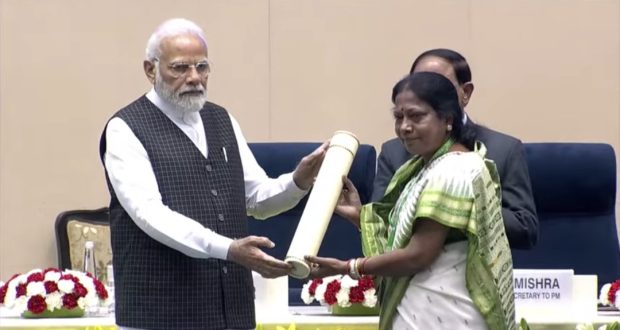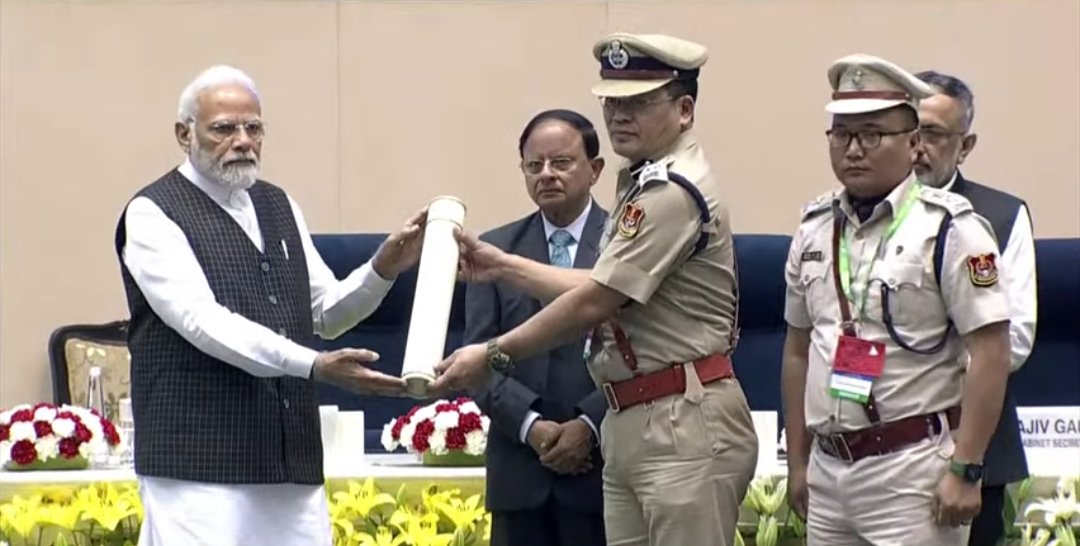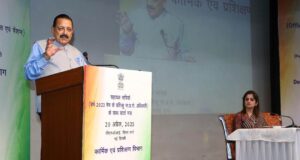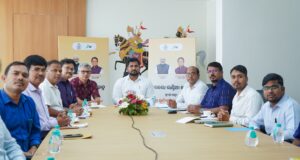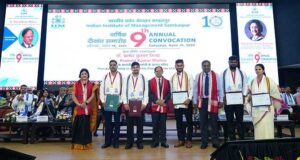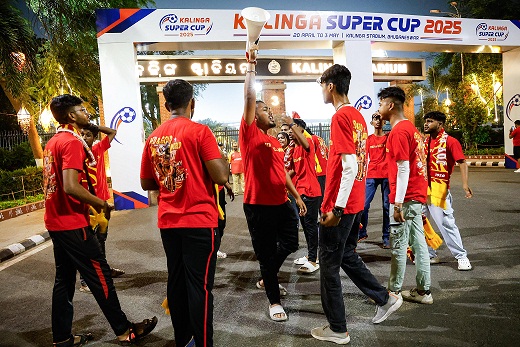Newdelhi:10/3/23:The Prime Minister Shri Narendra Modi today inaugurated the 3rd Session of the National Platform for Disaster Risk Reduction (NPDRR) in New Delhi. The main theme of the 3rd session of this platform is “Building Local Resilience in a Changing Climate”.
During the event, the Prime Minister felicitated awardees of the Subhash Chandra Bose Aapda Prabandhan Puraskar. The winners of the 2023 Puraskar are Odisha State Disaster Management Authority (OSDMA) and the Lunglei Fire Station, Mizoram. The Prime Minister also inaugurated the exhibition for showcasing innovative ideas, initiatives, tools and technologies in the field of Disaster Risk Reduction. The Home Minister, Shri Amit Shah, Minister of State Shri Nityanand Rai were among those present on the occasion.
Speaking on the occasion, the Prime Minister noted the global appreciation for the work of the Indian rescue team in Türkiye and Syria recently which has made every Indian proud. The Prime Minister said that the way India has expanded the technology and human resources related to disaster management has served the country well. He said that these awards have been instituted in order to strengthen and promote the disaster management system and also infuse healthy competition. The Prime Minister lauded both awardees.
The Prime Minister said that the theme of event “Building Local Resilience in a Changing Climate” is familiar for Indian tradition as this element is clearly visible in the wells, architecture, and old cities. He said, In India, the system, solutions and strategy of disaster management has always been local. He gave an example of Bhunga houses of Kutch which survived the earthquake to a large extent. The Prime Minister stressed the need to evolve local models of housing and town planning as per new technologies. “Enriching local technology and material with the new technology is the need of the hour. When we link the examples of local resilience with future technology, only then we will be able to do better in the direction of disaster resilience”. He added.
“Recognition and Reform are the two main components for strengthening disaster management”, the Prime Minister underlined. He explained that recognition will help in identifying the possible threats posed by natural calamities and when it will strike in the future, while reform is a system where the threats of a possible natural calamity is minimized. He suggested improving the system by making it more capable in a time bound manner and emphasized the approach of long term thinking instead of short-cut. He recalled the hundreds of fatalities caused due to cyclones hitting West Bengal and Odisha in the previous years, but with the changes in time and strategies, India is now capable of dealing with cyclones where damage to life and property is minimized. “We cannot stop natural calamities but we can definitely minimize its effects by putting better strategies and systems in place”, the Prime Minister remarked as he emphasized on adopting a proactive approach rather than a reactive one.
The Prime Minister talked about the poor state of disaster management in the years after Independence. He informed that even after five decades, there was no law regarding disaster management. Gujarat was the first such state that came out with the state disaster management act in 2001. The then Central Government enacted Disaster Management Act on the basis of this act. After that, the National Disaster Management Authority came into existence.
The Prime Minister emphasized the need to strengthen disaster management governance in the local bodies. “We will have to institutionalize planning and review local planning. Underlining the need for overhaul of the complete system, the Prime Minister called to work on two levels. First, disaster management experts will have to focus more on public participation. He stressed a continuous process of making people aware about the dangers of earthquakes, cyclones, fire and other calamities. It is important to impart awareness about proper process, drill and rules in this regard. “You will get success only by following the mantra of Local Resilience by Local participation”, he said while asking the stakeholders to use train ‘Yuvak Mandals’ and ‘Sakhi Mandals’ at village and neighborhood levels. He asked to further strengthen the mechanisms of Apada Mitr, NSS-NCC, Army veterans and need to ensure equipment in the community centers for the first response as timely start of the rescue work can save many lives.
On the second level, the Prime Minister asked for a real time registration and monitoring system using technology. He said, “Knowledge on aspects like age of the houses, drainage, resilience of our electricity and water infrastructure will help in taking proactive steps.” The Prime Minister talked about the discussion on the hospital fires during his recent review meeting on the heatwave and how regular review of fire preparedness of the hospital can save lives.
Concluding the address, the Prime Minister underlined that India reacts quickly to the disasters coming around the world and also responds and takes initiative for resilient infrastructure. He informed that more than 100 countries of the world have joined the Coalition for Disaster Resilient Infrastructure formed under India’s leadership.The Prime Minister expressed confidence that today’s discussions will lead to lots of suggestions and solutions and thereby lead to emergence of actionable points for the future. “Tradition and technology are our strength, and with this strength, we can prepare the best model related to disaster resilience not only for India but for the entire world” the Prime Minister concluded.
NPDRR is a multi-stakeholder platform constituted by the Government of India to facilitate dialogue, sharing experiences, views, ideas, action-oriented research & explore opportunities in the area of Disaster Risk Reduction.
 Odisha news today, Latest Oriya News Bhubaneswar Online Odia news Portal
Odisha news today, Latest Oriya News Bhubaneswar Online Odia news Portal
